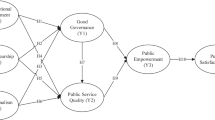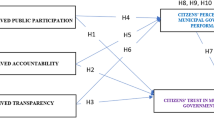Abstract
This study aims to investigate factors related to the State Civil Apparatus that influence Public Empowerment and Public Satisfaction in Central Kalimantan Province. The variables involved in this study are Organizational Commitment, Entrepreneurship, Professionalism, Good Governance, Public Service Quality, Public Empowerment, and Public Satisfaction. This research was conducted in the Organizational Structure of the Regional Apparatus that provides direct services to the public in the area of Central Kalimantan Province, as many as 14 districts and cities. The sample unit used was The Regional Organizational Structure (ROS) as much 430. Samples were taken by purposive sampling technique. The results of this study indicate that organizational commitment, entrepreneurship and professionalism are the driving factors for good governance and public service quality. Central Kalimantan provincial government should pay attention to the organizational commitment, entrepreneurship and professionalism of the state civil apparatus to improve good governance, public service quality, public empowerment and public satisfaction. The novelty of this research is involving the behavior of the State Civil Apparatus (organizational commitment, entrepreneurship and profesionalism) to drive Public Empowerment and Public Satisfaction. Besides that, this study implicates Good Governance and Public Quality Service as mediation.

Similar content being viewed by others
References
Achmad, D. (2006). Concept and good corporate governance implementation: In Indonesian Context. Jakarta: Ray Indonesia.
Adhiputra, M. W. (2017). Pengaruh kepuasan kerja dan komitmen organisasional terhadap kualitas layanan hotel. Business Management Journal, 11(2).
Astrina, F. (2016). Pengaruh Budaya Organisasi, Komitmen Organisasi dan Penerapan Prinsip-Prinsip Good Corporate Governance (GCG) Terhadap Kinerja Perguruan Tinggi Dengan Pendekatan Balanced Scorecard (BSC). Jurnal Ilmiah Ekonomi Global Masa Kini, 7(1), 61–78.
Astuti, F., & Fithri, R. (2013). Motivasi enterpreneur pada pegawai negeri sipil. Jurnal Penelitian Psikologi, 4(02).
Awamleh, N. A. (1996). Organizational commitment of civil service managers in Jordan: a field study. Journal of Management Development.
Azlina, N., & Amelia, I. (2014). Pengaruh Good Governance dan pengendalian intern terhadap kinerja pemerintah kabupaten pelalawan. Jurnal Akuntansi Universitas Jember, 12(2).
Bartlett, D., & Dibben, P. (2002). Public sector innovation and entrepreneurship: Case studies from local government. Local Government Studies, 28(4), 107–121.
Basri, H., Ulfah, A. K., & Majid, M. (2017). The implementation of good corporate governance (GCG) to improve service quality: the case of state-owned electricity company in Indonesia.
Chambers, R. (1995). Memahami desa secara partisipatif. yogyakarta: penerbit kanisius.
Covin, J. G., & Miles, M. P. (1999). Corporate entrepreneurship and the pursuit of competitive advantage. Entrepreneurship Theory and Practice, 23(3), 47–63.
Denhardt, R. B., & Denhardt, J. V. (2003). The new public service: An approach to reform. International Review of Public Administration, 8(1), 3–10.
Deolalikar, A. B., Jha, S., & Quising, P. F. (2015). Governance in developing Asia: Public service delivery and empowerment. Edward Elgar. Cheltenham.
Dwi, A. (2015). Pengaruh mekanisme good corporate governance dan financial distress terhadap manajemen laba (Studi Kasus Pada Perusahaan Perbankan Yang Terdaftar Di Bursa Efek Indonesia Periode 2009-2014). Jurnal Akuntansi AKUNESA, 3(2), 101–109
Fawcett, S. E., Ogden, J. A., Magnan, G. M., & Cooper, M. B. (2006). Organizational commitment and governance for supply chain success. International Journal of Physical Distribution & Logistics Management.
Fernandes, A.A.R., & Sumardi. (2016). “The mediating effect of service quality and organizational commitment process alignment on higher education performance in Makassar, Indonesia”. Journal of Organizational Change Management, 31(2), pp. 410–425, Malangr, Universitas Brawijaya.
Ganie, R. M. (2000). Good Governance: Prinsip, Komponen dan Penerapannya dalam HAM. Jakarta: Bappenas.
Gelderen, B. R., & Bik, L. W. (2016). Affective organizational commitment, work engagement and service performance among police officers. Policing: An International Journal of Police Strategies & Management.
Gill, A. (2005). Governing violence: Gender, community and state interventions. Safer Communities, 4(2), 37.
Idris, S. (2014). Demokrasi dan Filsafat Pendidikan (Akar Filosofis dan Implikasinya dalam Pengembangan Filsafat Pendidikan). AR-RANIRY PRESS. Banda Aceh.
Hartini, S. (2009). Penegakan hukum netralitas pegawai negeri sipil (PNS). Jurnal Dinamika Hukum, 9(3), 296–305.
Hellman, J. S., Geraint J., Daniel, K., & Mar, S. (2000). Measuring governance, corruption, and state capture: How firms and bureaucrats shape the business environment in transition economies. Policy research working papers. World Bank Institute and European Bank for Reconstruction and Development. Washington, D.C.
Hisrich, R., Langan-Fox, J., & Grant, S. (2007). Entrepreneurship research and practice: A call to action for psychology. American Psychologist, 62(6), 575.
Huda, M., Mulyadi, D., Hananto, A. L., Muhamad, N. H. N., Teh, K. S. M., & Don, A. G. (2018). Empowering corporate social responsibility (CSR): insights from service learning. Social Responsibility Journal.
Ifdayanti, S. (2011). Pengaruh good governance terhadap kualitas pelayanan publik pada kantor unit pelaksana teknis dinas (UPTD) Balai Metrologi Medan.
Juwita, N. M. R. (2011). Kualitas pelayanan publik dalam meningkatkan kepuasan masyarakat pada kantor camat abang kabupaten karangasem.
Kadisi, R., & Soegoto, A. S. (2017). Sikap Mental Entrepreneurial Government Terhadap Kinerja Aparatur Pemerintah Daerah Di Kabupaten Kepulauan Sitaro. Jurnal EMBA: Jurnal Riset Ekonomi, Manajemen, Bisnis dan Akuntansi, 5(2).
Kalangi, R. (2015). Pengembangan sumber daya manusia dan kinerja aparat sipil negara di Kabupaten Kepulauan Sangihe Provinsi Sulawesi Utara. Jurnal LPPM Bidang EkoSosBudKum, 2(1), 1–18.
Kasmir. (2006). Kewirausahaan. Jakarta: Raja Grafindo Persada.
Kaur, G., Sharma, J., & Lamba, T. (2012). Exploring the impact of total quality service on bank employees’ organisational commitment. Asian Journal on Quality.
Kotler, P. (2000). Marketing management. Prentice Hall Intl, Inc New Jersey.
Kuratko, D. F., & Hodgetts, R. M. (1995). Entrepreneurship: A contemporary approach. Dryden Press.
Kusnandar, A. (2007). Membudayakan Profesionelisme Kerja. Tarsito. Bandung.
Lampinen, M. S., Suutala, E., & Konu, A. I. (2017). Sense of community, organizational commitment and quality of services. Leadership in Health Services.
Lodjo, F. S. (2013). Pengaruh pelatihan, pemberdayaan dan efikasi diri terhadap kepuasan kerja. Jurnal EMBA: Jurnal Riset Ekonomi, Manajemen, Bisnis dan Akuntansi, 1(3).
Lok, P., & Crawford, J. (2003). The effect of organizational culture and leadership style on job satisfaction and organizational commitment: A cross-national comparison. Journal of Management Development, 23, 321–338. https://doi.org/10.1108/02621710410529785
Lupiyoadi, R., & Hamdani, A. (2006). Manajemen Pemasaran Jasa, Jakarta: Penerbit CV Alfabeta.
Luthans, F. (1998). Organizational behavior Elevent edition. Mc Growth-Hill Book co. Singapore.
Mahenthiran, S., Terpstra-Tong, J. L. Y., Terpstra, R., & Rachagan, S. (2015). Impact of executive citizenship and organizational commitment on corporate social responsibility. Social Responsibility Journal.
Maryam, N. S. (2017). Mewujudkan good governance melalui pelayanan publik. JIPSI-Jurnal Ilmu Politik dan Komunikasi UNIKOM, 6.
McNeese-Smith, D. (1996). Increasing employee productivity, job satisfaction, and organizational commitment. Journal of Healthcare Management, 41(2), 160.
Moelyarto. (1999). Politik Pembangunan Sebuah Analisis, Konsep, Arah dan Strategi, Tiara Wacana Yogya,Yogyakarta.
Moenir, A.S. (2002). Manajemen sumber daya manusia modern. Rosda Karya. Bandung.
Mowday, R. T., Porter, L. W., & Steers, R. (1982). Organizational linkages: The psychology of commitment, absenteeism, and turnover.
Mulyasa, E. (2006). Kurikulum tingkat satuan pendidikan: Sebuah panduan praktis. Bandung: PT Remaja Rosdakarya.
Mulyono, A. (2015). Pengembangan Kapasitas Aparatur Sipil Negara di Daerah. JKMP (jurnal Kebijakan Dan Manajemen Publik), 3(1), 17–34.
Mustafid, H. (2017). Peningkatan kinerja aparatur sipil negara melalui budaya organisasi. Tarbawi: Jurnal Keilmuan Manajemen Pendidikan, 3(01), 1–14.
Ndraha, T. (1999). Pengantar teori pengembangan sumber daya manusia. Rineka Cipta, Jakarta.
Niode, I. Y. (2012). Pengaruh Kompensasi terhadap Implementasi Entrepreneurial Government dan Kinerja Aparatur Pemerintah Daerah (Studi pada Pemerintah Daerah Provinsi Gorontalo). Jurnal Aplikasi Manajemen, 10(4), 832–841.
Otto, O. (2018). Moderating effect of organizational citizenship behavior on the effect of organizational commitment, transformational leadership and work motivation on employee performance. International Journal of Law and Management Just-Accepted, 2018, 00–00.
Parasuraman, A. (2014). The Behaviorial Consequenses of Service Quality. Prentince Hall.
Pinho, J. C., Rodrigues, A. P., & Dibb, S. (2014). The role of corporate culture, market orientation and organisational commitment in organisational performance. Journal of Management Development.
Putri, G. Y. (2013). Pengaruh Komitmen Organisasi dan Sistem Pengendalian Intren Pemerintah (SPIP) terhadap Kinerja Manajerial SKPD (Studi Empiris pada Satuan Kerja Perangkat Daerah Kota Padang). Jurnal Akuntansi, 1(1), 1–10.
Putri, G. Y. (2016). Pengaruh Komitmen Organisasi dan Sistem Pengendalian Intren Pemerintah (SPIP) terhadap Kinerja Manajerial SKPD (Studi Empirispada Satuan Kerja Perangkat Daerah Kota Padang).
Rahman, S., Islam, M. Z., Abdullah, A. D. A., & Sumardi, W. A. (2018). Empirical investigation of the relationship between organizational factors and organizational commitment in service organizations. Journal of Strategy and Management.
Rangkuti, F. (2003). Measuring customer satisfaction: gaining customer relationship strategy. Jakarta: PT Gramedia Pustaka Utama.
Rewansyah, A. (2010). Reformasi birokrasi dalam rangka good governance. Yusaintanas Prima.
Rod, M., & Ashill, N. J. (2010). Management commitment to service quality and service recovery performance. International Journal of Pharmaceutical and Healthcare Marketing.
Sadler, R. J. (2010). Corporate entrepreneurship in the public sector: the dance of the chameleon. Australian Journal of Public Administration, 59(2), 25–43.
Sakke, Y. (2013). Analisis Implementasi Kebijakan Good Governance Terhadap Kinerja Bank Umum Pada Pt Bank Sulteng. Jurnal Katalogis, I(1), 1–15.
Samiun, B., Sjahruddin, H., & Purnomo, S. H. (2017). Pengaruh pemberdayaan terhadap kepuasan kerja karyawan.
Sancoko, H. W. (2015).Analisis yuridis peranan pemerintah daerah kabupaten banyuwangi dalam penataan reklame berdasarkan peraturan daerah kabupaten banyuwangi nomor 10 tahun 2012 tentang penyelenggaraan reklame.
Saxena, K. B. C. (2005). Towards excellence in e‐governance. International Journal of Public Sector Management.
Setyadi I. T., & Subanu, I. L. P. (2005). Evaluasi implementasi proyek inovasi manajemen perkotaan pekerjaan pemberdayaan sektor informal pedagang kaki lima kota magelang (Doctoral dissertation, [Yogyakarta]: Universitas Gadjah Mada).
Sudrajat, T., & Karsona, A. M. (2016). Menyoal Makna Netralitas Pegawai Negeri Sipil dalam Undang-Undang Nomor 5 Tahun 2014 tentang Aparatur Sipil Negara. Media Hukum, 23(1), 8.
Supranto, J. (1997). Pengukuran Tingkat Kepuasan Pelanggan 76–78, 225–243. Penerbit Rineka Cipta, Jakarta.
Suriyani, E. (2014). Enterpreneurial government aparatur pemerintah pada badan kepegawaian daerah, pendidikan dan latihan Kota Banjarmasin. Al'ulum, 61(3).
Suryana. (2006), Kewirausahaan, Pedoman Praktis: Kiat dan Proses Menuju Sukses Jakarta: Salemba Empat.
Uar, A. (2016). Pengaruh pelaksanaan prinsip-prinsip good governance terhadap kinerja pelayanan publik pada badan pertahanan nasional (bpn) kota ambon. Otoritas: Jurnal Ilmu Pemerintahan, 6(1), 1–11.
Usman, J. (2011). Manajemen birokrasi profesional dalam meningkatkan pelayanan publik. Otoritas: Jurnal Ilmu Pemerintahan, 1(2).
Venkataraman, S., & Sarasvathy, S. D. (2001). Strategy and entrepreneurship: Outlines of an untold story. Handbook of strategic management, 650668.
Wardoyo, T. W., & Mujiasih, E. (2015). Efikasi Diri Dan Minat Berwirausaha Pada Pegawai Masa Persiapan Pensiun Di Pemerintah Kota Cirebon. Empati, 4(4), 315–319.
Wirasari, N. (2010). Peningkatan pelayanan publik melalui pemberdayaan aparatur kelurahan beji kecamatan ungaran timur dalam pengelolaan arsip. Rekayasa, 8(2).
Yudokusumo, A. B. (2014). “Pelaksanaan good governance di pt angkasa pura i bandar udara juanda surabaya”, Jurnal Kebijakan dan Manajemen Publik, Vol. 2.
Zampetakis, L. A., & Moustakis, V. S. (2010). An exploratory research on the factors stimulating corporate entrepreneurship in the Greek public sector. International Journal of Manpower.
Zimmerer, T., & Scarborough, N. M. (1996). Entrepreneurship and new venture formation. Prentice Hall.
Funding
This study was self-funded
Author information
Authors and Affiliations
Corresponding author
Ethics declarations
Ethical approval
This article does not contain any studies with human participants performed by any of the authors.
Conflict of interest
The authors declare that they have no conflict of interest.
Additional information
Publisher's Note
Springer Nature remains neutral with regard to jurisdictional claims in published maps and institutional affiliations.
Rights and permissions
About this article
Cite this article
Nor, R., Gani, A.J.A., Saleh, C. et al. Organizational commitment and professionalism to determine public satisfaction through good governance, public service quality, and public empowerment. Int Rev Public Nonprofit Mark 19, 191–217 (2022). https://doi.org/10.1007/s12208-021-00297-0
Received:
Accepted:
Published:
Issue Date:
DOI: https://doi.org/10.1007/s12208-021-00297-0




